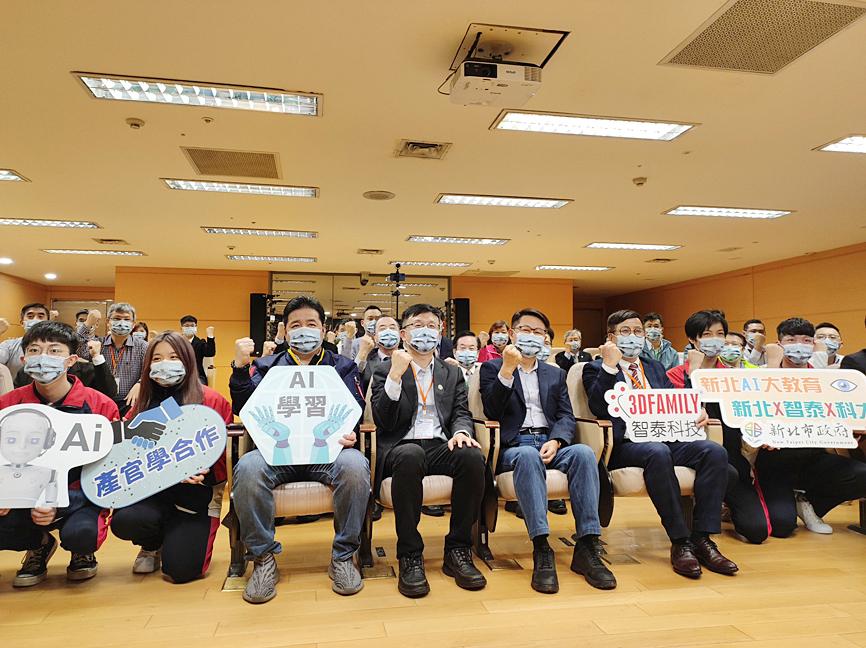New Taipei City is collaborating with industry and academia to promote artificial intelligence (AI) education.
In line with New Taipei City’s vision of becoming a smart city, 3DFamily Smart Inspection Group yesterday donated 2,500 sets of VisLab AI image recognition software to the Education Department.
The software is to be used to support classes at the city’s 50 senior-high, junior-high and elementary schools.

Photo: Lin Hsin-han, Taipei Times
Sixteen of the schools have set up career exploration centers, while 11 participate in a Maker and Tech program, New Taipei City Deputy Mayor Jonathan Chen (陳純敬) said, adding that the city government commissioned them so that students could be introduced to AI.
The city has also held AI programming competitions, and encouraged schools to promote information science and computer technology in line with a 12-year curriculum, also called the “108 curriculum,” Chen added.
Taishan Senior High School has been designated as the headquarters for promoting AI education, the department said.
The school is to train AI teachers, provide AI equipment, launch certification classes and develop teaching materials to improve students’ AI know-how and competitiveness on the global stage, it said.
The simple VisLab interface allows students unfamiliar with programming or AI databases to understand the principles of AI image recognition through the software, 3DFamily board chairman Hsu Chih-ching (許志青) said.
Users can immediately feel the convenience of AI technology, Hsu said, adding that he hoped the donation could help the city cultivate more technology talent.
To promote AI education “from the bottom up,” the city has also teamed up with National Taiwan University of Science and Technology (NTUST), Ming Chi University of Technology, Tungnan University, Hsing Wu University, Chihlee University of Technology, Asia Eastern University of Science and Technology, and Mackay Junior College of Medicine, Nursing and Management, it said.
The collaboration with academic institutions aims to lay a solid foundation for nurturing talent by training seed teachers at all education levels and sharing AI resources.
Today, universities often work closely with industry, NTUST president Yen Jia-yush (顏家鈺) said, adding that he hoped the collaboration nurtures more AI talent for industry.
Chen Po-han (陳柏翰), a senior at Taishan Senior High School, said he aims to learn more about AI image recognition as it is going to have wider application in the future.
Another senior, Yu Chun-hsiang (游竣翔), said AI is becoming a popular field, voicing his excitement over learning about it in high school.
“The smart city that New Taipei City is creating is human-oriented, and based on technology and education,” New Taipei City Education Department Commissioner Chang Ming-wen (張明文) said, adding that he hoped the technology and resources shared with schools would foster students with practical, innovative and versatile AI talent.

A preclearance service to facilitate entry for people traveling to select airports in Japan would be available from Thursday next week to Feb. 25 at Taiwan Taoyuan International Airport, Taoyuan International Airport Corp (TIAC) said on Tuesday. The service was first made available to Taiwanese travelers throughout the winter vacation of 2024 and during the Lunar New Year holiday. In addition to flights to the Japanese cities of Hakodate, Asahikawa, Akita, Sendai, Niigata, Okayama, Takamatsu, Kumamoto and Kagoshima, the service would be available to travelers to Kobe and Oita. The service can be accessed by passengers of 15 flight routes operated by

MORE FALL: An investigation into one of Xi’s key cronies, part of a broader ‘anti-corruption’ drive, indicates that he might have a deep distrust in the military, an expert said China’s latest military purge underscores systemic risks in its shift from collective leadership to sole rule under Chinese President Xi Jinping (習近平), and could disrupt its chain of command and military capabilities, a national security official said yesterday. If decisionmaking within the Chinese Communist Party has become “irrational” under one-man rule, the Taiwan Strait and the regional situation must be approached with extreme caution, given unforeseen risks, they added. The anonymous official made the remarks as China’s Central Military Commission Vice Chairman Zhang Youxia (張又俠) and Joint Staff Department Chief of Staff Liu Zhenli (劉振立) were reportedly being investigated for suspected “serious

ENHANCING EFFICIENCY: The apron can accommodate 16 airplanes overnight at Taoyuan airport while work on the third runway continues, the transport minister said A new temporary overnight parking apron at Taiwan Taoyuan International Airport is to start operating on Friday next week to boost operational efficiency while the third runway is being constructed, the Ministry of Transportation and Communications said yesterday. The apron — one of the crucial projects in the construction of the third runway — can accommodate 16 aircraft overnight at the nation’s largest international airport, Minister of Transportation and Communications Chen Shih-kai (陳世凱) told reporters while inspecting the new facility yesterday morning. Aside from providing the airport operator with greater flexibility in aircraft parking during the third runway construction,

American climber Alex Honnold is to attempt a free climb of Taipei 101 today at 9am, with traffic closures around the skyscraper. To accommodate the climb attempt and filming, the Taipei Department of Transportation said traffic controls would be enforced around the Taipei 101 area. If weather conditions delay the climb, the restrictions would be pushed back to tomorrow. Traffic controls would be in place today from 7am to 11am around the Taipei 101 area, the department said. Songzhi Road would be fully closed in both directions between Songlian Road and Xinyi Road Sec 5, it said, adding that bidirectional traffic controls would